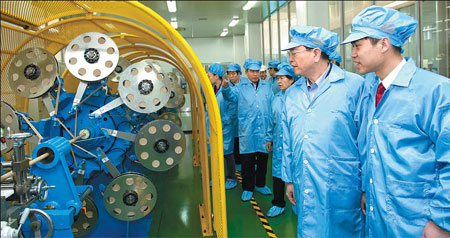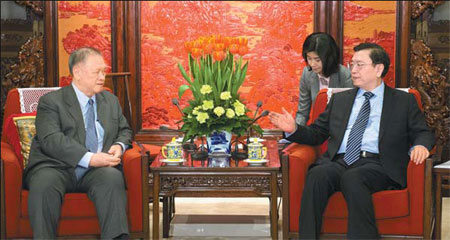Power should not be aloof from supervision
Updated: 2013-03-18 07:54
By Xinhua (China Daily)
|
|||||||||||
Profile | Zhang Dejiang
|
Zhang Dejiang (second from right) visits a laboratory on the application of superconducting technology at a plant of Futong Group in Tianjin on Feb 22. Huang Jingwen / Xinhua |
|
Zhang Dejiang (right) meets with Lim Jock Seng, Brunei's second minister of foreign affairs and trade, in Beijing on Jan 30. Li Xueren / Xinhua |
More than a hundred days after becoming a member of the top decision-making body of the ruling Communist Party of China, Zhang Dejiang was elected as China's top legislator on Thursday to lead the Standing Committee of the National People's Congress, the institution at the apex of State power in China.
As the ninth chairman of the NPC Standing Committee since the founding of the People's Republic of China in 1949, 66-year-old Zhang faces many heavy responsibilities as China increasingly emphasizes reliance on the rule of law to govern the country in the new era.
Legal advocate
Reliance on the rule of law in governing the country is the CPC's basic policy in leading the people to rule the country.
Zhang perceives the rule of law as the fruit of the progress of human civilization, as well as the fundamental guarantee of a harmonious and healthy society and a prosperous and strong country.
The NPC is sovereign in China as it is authorized by the Constitution to elect the country's top leadership, enact laws and supervise the State Council, the Supreme People's Court and the Supreme People's Procuratorate. The NPC Standing Committee serves as its executive body when the NPC is not in session.
Since he was elected as a member of the Standing Committee of the Political Bureau of the CPC Central Committee in November, Zhang has reiterated several times the importance of stepping up the construction of the national democratic legal system and channeling every type of work through it.
One of his major concerns is legislation in the field of the environment.
At a panel discussion on March 4 during the recently concluded annual session of the Chinese People's Political Consultative Conference National Committee, the top political advisory body, Zhang acknowledged the necessity of environmental legislation.
"The heavy smog that shrouded northern China, including Beijing, for several days has further heightened public concern about environmental protection," Zhang said.
Zhang recalled that he could drink directly from a brook when he got thirsty while working as an "educated youth" in rural areas more than 40 years ago. "I'm afraid no one dares to drink directly from it now," he said.
Zhang was sent to Luozigou Commune, Wangqing county, in Jilin province in 1968 to work as an "educated youth" - a term referring to young intellectuals dispatched to the countryside from cities to learn from farmers during the "cultural revolution" (1966-76).
Zhang held the post of chairman of the Standing Committee of the Jilin Provincial People's Congress, the provincial legislative body, while serving as Jilin's Party chief from 1995 to 1998. In this role, he attached great importance to legislative work.
In fact, he undertook much exploration to improve legislative work in his jurisdiction while serving in several provincial-level regions.
"(We) should always take enhancing and safeguarding the fundamental interests of the broadest mass of the people as both the starting point and goal of legislation," Zhang said in 2005 when he served as Party secretary of Guangdong, a booming economic province in South China.
He stressed the need to follow the mass line and adhere to a democratic, open and scientific legislative process while gradually expanding citizens' orderly participation in legislative work.
When he served as Party chief of Chongqing municipality, a post he held between March and November in 2012, Zhang reiterated the importance of cultivating a legal environment.
"Everyone is equal before the law, and it is absolutely impermissible for any organization or individual to stand above the law," he said, calling for efforts to "resolutely prevent and oppose the practice of taking a person's words or power as a substitute for the law and intervening in individual cases".
He called for "enhanced awareness and capability to govern and serve society through law and solve problems and settle disputes through legal means".
Non-Communist Party members constitute an important part of the NPC Standing Committee.
While attending events held by non-Communist parties recently, Zhang expressed his hope that they would research and offer suggestions on topics including social management and governance by law since many of their members are specialists in the social and legal fields.
Supervision of power
"All of our power is bestowed by the people. The foremost duty of the ruling power is to serve the people," Zhang said in a signed article published in 2006.
"Power should never be used to seek personal gain, and it should not be aloof from public supervision and restraint," he said.
The CPC should improve its leading role regarding the work of people's congresses and respect their status if it wants to improve the quality of governance and consolidate its ruling status, Zhang once said while serving as Guangdong's Party chief.
"Adhering to and improving the people's congress system and giving full play to the functions of people's congresses and their standing committees is of importance to the overall situation of the country's reform, development and stability," he said.
He stressed that people's congresses and their standing committees at various levels should build themselves into genuine local State power organs that shoulder various functions empowered by the Constitution and the law and keep close ties with the people.
Zhang was born in Tai'an county, Liaoning province, in November 1946. He joined the CPC in January 1971. He graduated from the Department of Economics at Kim Il-sung University in the Democratic People's Republic of Korea.
Zhang is married to Xin Shusen, a senior economist and a member of the 11th CPPCC National Committee. They fell in love while working as "educated youths" in the countryside and have one daughter.
Zhang served as vice-president of Yanbian University, deputy secretary of the CPC Yanji city committee and later deputy secretary of the CPC Yanbian prefecture committee in Jilin province. In 1986, he went to Beijing after being appointed vice-minister of civil affairs and deputy secretary of the ministry's leading Party members' group.
Zhang served as Party chief in four provincial-level regions - the provinces of Jilin, Zhejiang and Guangdong, and Chong-qing municipality - from 1995 until late 2012. He also served as vice-premier over the past five years.
Before he was elected to the Standing Committee of the Political Bureau of the 18th CPC Central Committee on Nov 15, Zhang was a member of the Political Bureau of the CPC Central Committee for two consecutive terms.
Zhang has repeatedly emphasized the supervisory role of people's congresses during his political career.
"The NPC and its Standing Committee should conduct supervision in a firm and confident manner," he said in 2003, encouraging them to enhance supervision so as to ensure that the State Council, the Supreme People's Court and the Supreme People's Procuratorate and their personnel govern by law and ensure justice.
He has repeatedly called on the State Council, the Supreme People's Court and the Supreme People's Procuratorate to accept supervision and improve the mechanism of reporting their work to the NPC and its Standing Committee and informing them of major issues.
Moreover, he has called for efforts to improve the supervisory system by setting up a series of power restraint and supervisory mechanisms featuring intra-Party and public supervision as well as supporting the people's congresses and political advisory bodies to carry out their supervisory power independently in accordance with the law.
All these measures aim to put the power bestowed by the country's 1.3 billion people under better supervision and restraint.
Zhang also believes that the deputies to people's congresses, as the general public's spokespersons, should earnestly fulfill their duty and be models of law abidance.
"Efforts must be made to safeguard the deputies' right to know and expand channels for them to get access to information and to understand government affairs," he said.
Sense of responsibility
"I'll not leave until the water in the Nenjiang River retreats to a safe level," said Zhang as he was directing flood control and relief work in Jilin province in 1998.
The summer floods of 1998, the worst up to that time since 1954 on the Yangtze River in Central China and the most devastating flood ever in Northeast China, shocked the government and the people.
People still remember the image of Zhang boarding a motorboat to visit flood-stricken residents of a village in Zhenlai county, Jilin, when he was the province's Party chief.
When major disasters occurred, Zhang, as Party chief of provincial-level regions, would set out for the site immediately to oversee rescue operations.
Zhang also showed his concern for the people by attending to issues concerning their livelihood, such as employment and social security, during his five years serving as vice-premier of the State Council, where he was in charge of employment, social security and other important sectors.
On several occasions, Zhang reiterated that getting college graduates employed was a key task and efforts should also be made to help migrant workers from rural areas and disadvantaged groups to find jobs.
Based on extensive research, the State Council introduced a series of policies and measures to promote employment.
Meanwhile, Zhang put special emphasis on vocational training for laborers.
"An entire household could be lifted out of poverty with one family member finishing schooling or getting employed," he said.
Zhang advocated the building of a modern and lifelong education system as well as a vocational training system covering all laborers so as to tap human resources in a comprehensive way.
Zhang has attached great importance to the development of the private economy and stressed the importance of a sound policy environment for the sector's development.
"This is not a makeshift plan. Instead, it is a strategic policy," he said.
"The private economy will grow vigorously as long as we provide it with suitable soil and sunshine."
When he worked at the State Council, Zhang pushed for building a new-type of rural pension system and a pension system for urban residents. Now the systems cover almost every part of China.
In addition, when he served as Party chief of Guangdong, from 2002 to 2007, he was concerned about the development of the special administrative regions of Hong Kong and Macao.
While participating in discussions with NPC deputies from Hong Kong and Macao on March 7, Zhang acknowledged the great achievements made based on the successful implementation of the "one country, two systems" policy since the two regions returned to the motherland.
On March 8, he reiterated the need to strengthen cooperation between Guangdong, Hong Kong and Macao while participating in a panel discussion with lawmakers from Guangdong.
When he served as Guangdong's Party chief, Zhang put forth a creative plan to boost cooperation in the Pan-Pearl River Delta region, which strengthened economic links among nine provincial-level regions on the Chinese mainland, Hong Kong and Macao.
"CPC members should foster an image of clean governance, love of the people, pragmatism, plain living, hard work and perseverance," he once wrote in an article.
This is also Zhang's expectation for and portrayal of himself.
(China Daily 03/18/2013 page7)
Today's Top News
Police continue manhunt for 2nd bombing suspect
H7N9 flu transmission studied
8% growth predicted for Q2
Nuke reactor gets foreign contract
First couple on Time's list of most influential
'Green' awareness levels drop in Beijing
Palace Museum spruces up
Trading channels 'need to broaden'
Hot Topics
Lunar probe , China growth forecasts, Emission rules get tougher, China seen through 'colored lens', International board,
Editor's Picks

|

|

|

|

|

|







